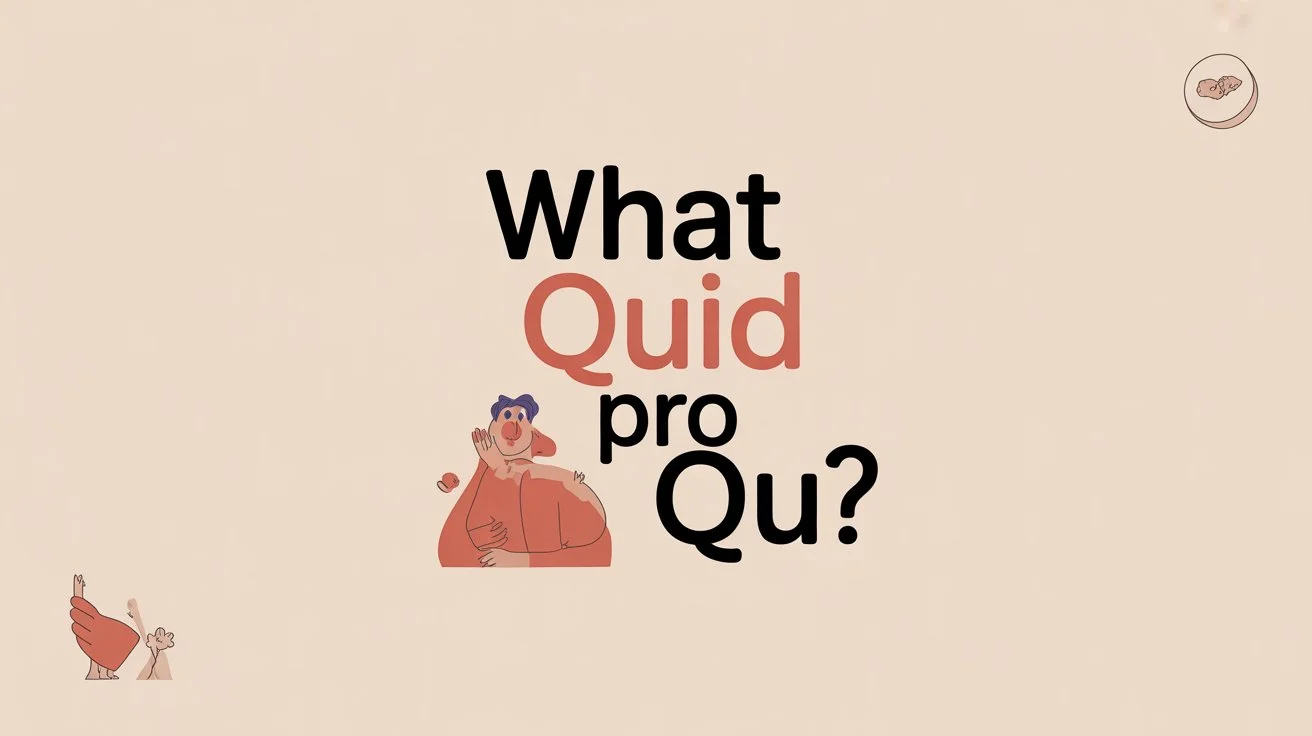Ever seen someone say a phrase so fancy it sounds like it came straight out of a courtroom drama? Yup—“quid pro quo” is one of those.
It’s a phrase people throw around in business, relationships, politics, and even memes. But despite how “lawyer-ish” it sounds, the meaning is actually super simple, and you’ve definitely experienced it dozens of times in real life.
If you’ve been searching for 🚀what does quid pro quo mean🚀, here’s the complete, simplified, and 100% beginner-friendly guide—packed with examples, scenarios, and modern usage.
Let’s break it down like a conversation between two people who don’t vibe with overly complicated English.
⚡ Quick Answer (Simplified in 10 Seconds)
Quid pro quo = “You do something for me, I do something for you.”
It’s basically an exchange, a trade, or a give-and-take deal where both sides benefit.
Think:
- “You help me with my assignment, I’ll buy you a coffee.”
- “You promote my product, I’ll promote yours.”
That’s all it is.
🔥 Understanding the Phrase: Where It Comes From
The phrase comes from Latin, a language that loves making simple things sound dramatic.
“Quid” = something
“Pro” = for
“Quo” = something else
So it literally means “something for something.”
It used to be common in old medicine and trade, but today it shows up everywhere—from office culture to TikTok to negotiations.
The Modern Meaning (Made Gen-Z Friendly)
In today’s world, this phrase means:
👉 A mutual exchange where each person expects something in return.
It’s not charity.
It’s not one-sided.
It’s not forced (unless it’s used negatively—don’t worry, we’ll cover that too).
It’s a deal. A swap. A trade.
Everyday Examples That Make It Crystal Clear
Here are real-life scenarios that make the meaning obvious:
✔ 1. Friendship Scenario
A: “Can you help me move on Saturday?”
B: “Sure, if you help me clean my garage next week.”
→ That’s a quid pro quo.
✔ 2. Workplace Scenario
Your coworker says:
“I’ll finish the presentation if you handle the client emails.”
→ Another quid pro quo.
✔ 3. Social Media Scenario
Influencers swapping shoutouts:
“You tag me, I tag you.”
→ Classic exchange.
✔ 4. School or College Scenario
Study partner deal:
“You share your notes, I help you study before exams.”
→ Straightforward trade.
✔ 5. Business Scenario
Brands collaborating:
“You send free products, we create content for you.”
→ Win-win deal.
The pattern?
Both sides give something.
Both sides get something.
Is Quid Pro Quo Always Positive?
Not necessarily.
It depends on context.
There are three vibes it can carry:
⭐ 1. Neutral (Most Common)
Just a regular exchange without any emotional charge.
Example: bartering, business deals, partnerships.
⭐ 2. Positive
Win-win situations where both sides benefit.
Example: helpful collaborations, teamwork, mutual support.
⭐ 3. Negative (Usually When Misused)
Sometimes the phrase is linked with:
- unfair pressure
- exploitation
- workplace harassment
- unethical deals
Example:
A boss saying, “I’ll give you a promotion if you do something personal for me.”
This is not okay and is the darker, problematic side of the phrase.
But in normal everyday usage, it’s mostly harmless and practical.
🤝Why the Phrase Is Used So Much Today
Because the modern world runs on exchanges:
- You like someone’s post → they like yours back.
- You give a discount → customer gives a review.
- You promote a song → the artist reposts you.
Everything is structured around mutual benefit.
So instead of saying “trade” or “exchange,” people use this Latin phrase to sound:
- more professional
- more serious
- more formal
- more business-y
But the meaning stays the same.
📱Quid Pro Quo on Social Media (The Trendy Side)
Here’s how the phrase plays out online:
🔸 Influencer Collabs
Brand sends PR → Creator makes content.
Simple give-and-take.
🔸 Engagement Groups
“You comment on my post, I’ll comment on yours.”
Yes, it’s a quid pro quo digital ecosystem.
🔸 Viral Memes
People exaggerate it for fun:
“My dog gives me attention, I give him snacks. Quid pro woof.”
You’ll see meme pages use the phrase ironically.
🗣️How to Use the Phrase in a Sentence (With Examples)
Here are natural, modern, real-life usages:
- “It’s a quid pro quo. We both help each other out.”
- “Their partnership is totally a quid pro quo arrangement.”
- “We made a simple quid pro quo deal—he tutors me, I design his website.”
- “They expect a quid pro quo benefit in return.”
- “This isn’t charity; it’s quid pro quo.”
Use it anytime you want to sound:
- smart
- polished
- professional
- or just a little dramatic
🔍What People Often Confuse About It
A lot of people think quid pro quo always means something illegal or shady.
But that’s not true.
❌ Misconception 1: “It’s always bad.”
Reality: Most of the time, it’s just a normal exchange.
❌ Misconception 2: “It’s only used in business or law.”
Reality: It shows up in friendships, relationships, school, content creation, and daily life.
❌ Misconception 3: “It means bribery.”
Reality: Bribery is illegal.
Quid pro quo is simply mutual trade—unless used unethically.
💼 Quid Pro Quo in Professional Settings
In the workplace, this phrase pops up frequently, especially during:
- negotiations
- promotions
- partnerships
- project collaborations
- business deals
Examples:
- “We’ll provide training in exchange for your contract renewal.”
- “You handle marketing, we handle distribution.”
But HR also uses the term in harassment policies, where it refers to:
- exchanging job benefits for inappropriate favors
This is illegal and heavily regulated.
So the phrase can be professional or problematic, depending on the vibe.
❤️Quid Pro Quo in Friendships and Relationships
You might not realize, but relationships are full of these give-and-take moments:
- “I’ll cook dinner if you wash the dishes.”
- “You plan this weekend, I’ll plan the next one.”
- “You pick me up today, I’ll pay for snacks.”
It keeps things balanced and fair.
Just remember:
Healthy exchanges feel natural.
Toxic exchanges feel transactional.
🎯 Why Understanding This Phrase Matters Today
Because modern life is basically built on exchanges:
- networking
- collaborations
- content creation
- favors
- business deals
- daily interactions
Knowing this concept helps you:
- recognize fair deals
- avoid unfair ones
- communicate confidently
- sound more professional
- understand social dynamics better
Plus, using the phrase correctly instantly upgrades your vocabulary without sounding robotic.
📝 Simple Synonyms You Can Use Instead
If you want to avoid the Latin drama, here are plain-English options:
- trade
- exchange
- swap
- give-and-take
- mutual deal
- partnership
- bargain
- agreement
- reciprocal favor
These work perfectly in casual conversations.
🏁 Conclusion:
You don’t need a law degree to understand or use “quid pro quo.”
It’s just a mutual exchange—a “you help me, I help you” situation that happens every day around us.
Whether you’re:
- collaborating online
- studying with a friend
- negotiating a deal
- doing someone a favor
- or trading content shoutouts
You’re already participating in these exchanges without even realizing it.
So the next time someone uses this phrase, you won’t just understand it—you’ll be able to use it confidently, casually, and correctly.











